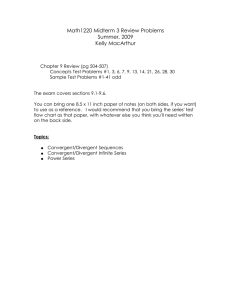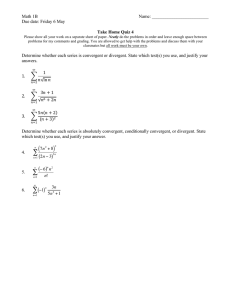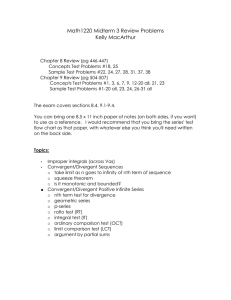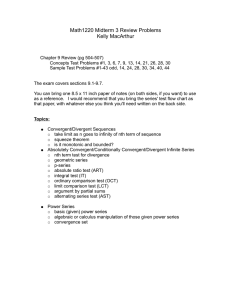Planning of questions for various level of reading of textbooks for
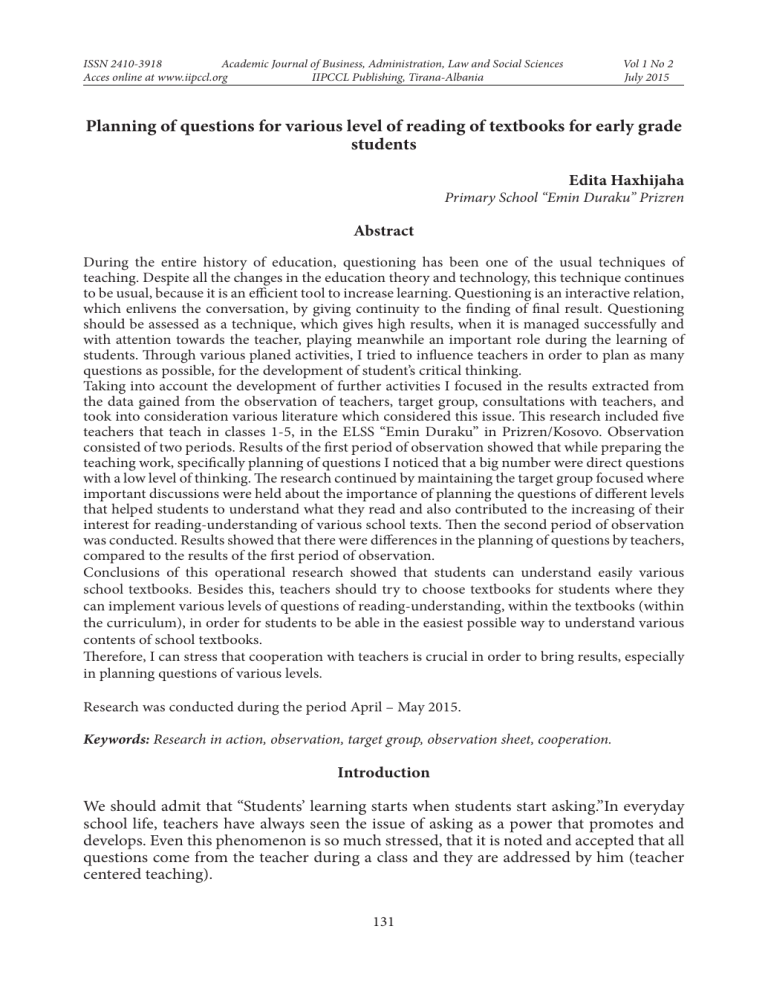
ISSN 2410-3918 Academic Journal of Business, Administration, Law and Social Sciences Vol 1 No 2
Acces online at www.iipccl.org IIPCCL Publishing, Tirana-Albania July 2015
Planning of questions for various level of reading of textbooks for early grade students
Edita Haxhijaha
Primary School “Emin Duraku” Prizren
Abstract
During the entire history of education, questioning has been one of the usual techniques of teaching. Despite all the changes in the education theory and technology, this technique continues to be usual, because it is an efficient tool to increase learning. Questioning is an interactive relation, which enlivens the conversation, by giving continuity to the finding of final result. Questioning should be assessed as a technique, which gives high results, when it is managed successfully and with attention towards the teacher, playing meanwhile an important role during the learning of students. Through various planed activities, I tried to influence teachers in order to plan as many questions as possible, for the development of student’s critical thinking.
Taking into account the development of further activities I focused in the results extracted from the data gained from the observation of teachers, target group, consultations with teachers, and took into consideration various literature which considered this issue. This research included five teachers that teach in classes 1-5, in the ELSS “Emin Duraku” in Prizren/Kosovo. Observation consisted of two periods. Results of the first period of observation showed that while preparing the teaching work, specifically planning of questions I noticed that a big number were direct questions with a low level of thinking. The research continued by maintaining the target group focused where important discussions were held about the importance of planning the questions of different levels that helped students to understand what they read and also contributed to the increasing of their interest for reading-understanding of various school texts. Then the second period of observation was conducted. Results showed that there were differences in the planning of questions by teachers, compared to the results of the first period of observation.
Conclusions of this operational research showed that students can understand easily various school textbooks. Besides this, teachers should try to choose textbooks for students where they can implement various levels of questions of reading-understanding, within the textbooks (within the curriculum), in order for students to be able in the easiest possible way to understand various contents of school textbooks.
Therefore, I can stress that cooperation with teachers is crucial in order to bring results, especially in planning questions of various levels.
Research was conducted during the period April – May 2015.
Keywords: Research in action, observation, target group, observation sheet, cooperation.
Introduction
We should admit that “Students’ learning starts when students start asking.”In everyday school life, teachers have always seen the issue of asking as a power that promotes and develops. Even this phenomenon is so much stressed, that it is noted and accepted that all questions come from the teacher during a class and they are addressed by him (teacher centered teaching).
131
ISSN 2410-3918 Academic Journal of Business, Administration, Law and Social Sciences Vol 1 No 2
Acces online at www.iipccl.org IIPCCL Publishing, Tirana-Albania July 2015
Students should answer teacher’s and book’s questions. They are not seen as education subject which can produce questions. Very few teachers have tried to bring to the center of attention the issue of questions being asked by students. Students’ questions come spontaneous and rare. To develop a powerful interactive learning process, teachers have to ask questions about a certain topic. Transformation of teaching with students brings an innovation in the learning process.These are prosperous classes, where students, during the class, take their time to learn: by reading, writing and speaking.
The process of articulating questions by students during class brings other positive aspects in classes oriented towards the interactive teaching, with the aim of learning from students.
School textbooks filled with such didactic elements need to be analyzed in various ways.
In this sense, planning the questions is one of the most important matters in the teaching process. They do not only exercise student’s memory, but also the student’s learning for interaction, various activities during the class and also exercise the critical thinking. The
Planning and preparing of questions requires professional knowledge and abilities from a teacher. It is necessary to increase the awareness and professional development of teachers for better planning of questions which encourage and develop critical thinking in order to create student thinkers, not just remembering development. Thus, cooperation with teachers will mitigate this problem which is present in the learning process. This will affect their professional development, which is meanwhile not only needed but also essential in modern teaching and learning.
Categories of questions
Gallagher and Aschner classify questions in four categories:
1) Cognitive questions, related to memory. These are the kind of questions which call the simple memory for information. Example: Who invented penicillin?
2) Convergent questions. They are the kind of questions requiring an opinion and for which there is only one correct response . Example: See the photo. Why both triangles are similar?
3) Divergent question. They are unfinalized questions, which make a student think, but for which there is no single correct answer. Divergent questions stimulate creative thinking and imagination. Example: What course would have taken the development of country, if the liberal – democratic views of S. Malshova would have been accepted?
4) Evaluative questions . These are the kind of questions which put in action students’ judgment. Example: Did Albanian state act wisely in using Drini River to produce electricity?
Teachers should pay attention when choosing questions and always depending on aims they wish to achieve.
Criteria for effective questions
Several criteria are set which serve to make as more effective questions as it is possible.
They can be used not only in the classroom, but also in tests, written assignments, exams, etc. Those criteria are:
• A common question should require something defined. It should be expressed in a simple, clear and direct language, in order for students to understand.
• A question is appropriate when it is challenging and provokes thinking. The main aim of questioning is to stimulate learning.
132
ISSN 2410-3918 Academic Journal of Business, Administration, Law and Social Sciences Vol 1 No 2
Acces online at www.iipccl.org IIPCCL Publishing, Tirana-Albania July 2015
• Appropriate question is adapted to age, skills and interests of students.
• Question should suit its purpose.
Managing of questions and answers
Students should be encouraged to make questions. The basic question lies in the way of encouraging students to make questions. This will be achieved by creating a free, tolerant atmosphere in which students’ opinions are welcomed and respected. Obviously this should be done if the studied material is interesting and important to them. In order to fulfill this requirement, teachers should wonder how to achieve it. This is done by starting from the time of planning and writing the class book.
Not all students’ questions are important. Questions of a lower importance, but sincere, can be answered briefly, but they shall never be left unanswered. In the cases when a student remains unsatisfied by the answer, teachers should reach an agreement with him, to make the explanation individually, but later on, in order not to obstruct the class. The promise should be kept and in the first occasion, the matter should be discussed. In the occasion of important questions, it is a good idea to return to the issue for discussion. This should be done with another student or with the entire class. It may happen that we can’t answer a certain question. In this case there is nothing wrong to admit this impossibility.
Perhaps a student from the class might know the answer. In contrary, teachers should make efforts to find the answer or ask for somebody’s assistance. Later on, when the answer is found, we should make sure to tell it to the curious student.
Planning and addressing of questions
The academic level of students, very difficult questions, and abstract ones doesn’t help in learning, in contrary, they become source of desperation. Questioning should be considered more as a technique with which you can teach and a technique to see how much and what students know.
Often questions can be informal. They should be made in pleasant, easy manner and in a way to encourage communication. In this manner the necessary encouragement can be given to the students. Questions should be clear and specific. They should be addressed according to the logic and change pursuant to the complexity of state. Questions of the higher level should be based on those of lower level; students should be given sufficient time to think about answers. In this manner, everyone has an opportunity to review the question. This technique has another positive aspect. When we ask the question, nobody knows who will answer. This influences the students to be prepared. Nevertheless, every rule has its exceptions. It may happen to see an inattentive student. In this case it is better to mention his name first, and then ask him a question. In this way, it is required his attention, also the attention of others like him and the question helps them return to work.
Another technique that can keep an attentive class is by making the question only once. If, for any apparent reason, a student did not understand or hear, then repeating the question should be done only for courtesy. This rule can also be used to give a reply. Repeating the answers simply wastes time and promotes the lack of attention. If we want to address a lesson issue it is better to return to it in another way and not to repeat the answer. Another way to keep students ready is diffusive addressing of questions. Meanwhile the old system of control, calling students by alphabetic order or any other order should not be applied in this case, because it is “deadly” for students’ attention.
133
ISSN 2410-3918 Academic Journal of Business, Administration, Law and Social Sciences Vol 1 No 2
Acces online at www.iipccl.org IIPCCL Publishing, Tirana-Albania July 2015
Questions which can’t be answered should be avoided and those that require short and mechanical answers, because such situations create class dumps. The most important question is to understand that, in order to attract the natural and efficient attention of students, more interesting matters should be asked, to provoke thinking.
Questions that require thinking and challenging questions
A teacher who teaches should continuously have consideration of questions that require thinking. Even though these questions are not difficult to be used, they require more skills and preparation. It is easy to make “dry questions” regarding what is mentioned in the textbook. But this practice is not motivating. Thus, teacher should use questions that require thinking, until this becomes second nature. Every time when it seems suitable, “the assessing” questions should be practiced. Students should be asked often to assess eachothers answers, but this should be done in the form of sharing ideas and opinions: “Ana, do you agree with Genti?” Sometimes it is a good idea to ask questions whose answers are not in the lesson text. The best question which requires opinion, is the one which doesn’t have any concrete answer, we should insist in valid logical reasoning. Students should be allowed to express themselves, in order to defend their reasoning. But, on the other hand, teachers should accept very long reasoning, which creates confusion. We should bear in mind that correct understanding and proper use of questions that require thinking leads to real discussion and avoids teaching with questions and answers, simply “to catch”.
Many of the questions that require thinking are challenging questions. The whole idea is that the students are assisted in clarifying thinking, but, on the other hand, not to force them to draw conclusions. The purpose of the technique is not only to give a correct answer, but also the improvement of critical thinking.
Review of literature
Teachers ask questions, students answer. This form of teaching is sometimes called control of knowledge (improvement in learning) that was a practice for many years (Stodolsky,
1988). Teacher’s questions create a framework for giving the content of a particular lesson.
This scheme according to teacher’s view, consists of initiative (teacher asks questions, answer (student responds) and reaction (praise, correction, deepening or expansion in question) or IRE, Initiation (questions for control of knowledge), Response (response) and Evaluation (assessment) (Burbules & Bruce, 2001). Efficient techniques for making questions can be among the powerful tools that teachers can use during teaching classes.
A key element of contemporary didactic techniques is to divide involved students cognitively (in the cognitive process) and here are specifically efficient master strategies of making questions. Questions play multiple roles in cognition. They can help students in repeating information in order to better remember. They can function in identifying gaps in the knowledge fund of human, and to stimulate curiosity and long-term interest.
Types of questions
Some education researchers have calculated that a typical teacher makes around 30 to 120 questions during a class, or 1500000 questions during his entire carrier as a teacher (Sadker
& Sadker, 2006). All kinds of questions can be effective (Barden, 1995). Nevertheless, for different students, several models of questions are in general better than some others. The
134
ISSN 2410-3918 Academic Journal of Business, Administration, Law and Social Sciences Vol 1 No 2
Acces online at www.iipccl.org IIPCCL Publishing, Tirana-Albania July 2015 best models for small pupils and children with disabilities of any age are simple questions which enable a high percentage of correct answers, better encouragement, help when student doesn’t find the correct answer and recommendation. For students with higher skills, successful model includes tougher questions in higher levels as well as in lower ones, and also many critical opinions (assessments) (Berliner, 1987; Good, 1988). Regardless of the students’ age or skills, all of them should have some sort of experience with opinion encouraging questions and if it is necessary, to assist them in learning how to respond.
Students need time to think about the responses they will give. But, researches show that teachers wait approximately only one second for students to give them the answer (Rowe,
1974). When teachers learn to ask a question and then to wait at least 3 to 5 seconds before they ask a student to stand up and answer, students tend to give wider answers; more students tend to participate; to make more questions and to voluntarily give the required answers; students’ comments, which involve analysis, synthesis, deduction and guessing, tend to increase and students generally are more secure in their responses (Berliner, 1987;
Rowe , 1974; Sadker & Sadker, 2006).
Methodology
For collection of data the quantitative approach was used, research in action, involving observation method, focus group, whereas as the instrument was used the observation sheet.
1.1. Aim and research question
Every activity has a certain aim; therefore aim of this research is the professional training of teachers, through various ways, forms and activities, where teachers will be encouraged to plan as much as possible questions of high level and their implementation in the classroom which will influence in the understandable reading of textbooks.
Question of the research is:
How do different level questions influence in reading – understanding of early grade students?
1.2. Context of school and participants
The action research was conducted in the parallels I1, II1, III1, IV 1, V 1 of (ELSS) “Emin
Duraku” School in Prizren. Data was collected in the above mentioned classes; also activities were implemented in these classes.
Analysis and interpretation of data
In the first period of observation were collected data regarding the kind of questions teachers ask during the process of teaching and their influence in the students’ development of thinking. Besides this, part of observation was also the way of asking questions and answers, how much teachers adhere to the performance, steps of asking questions as well as time of break, waiting time after asking. All of these factors influence in students’ thinking and quality of answers. Data collected from the observation in the first period
135
ISSN 2410-3918 Academic Journal of Business, Administration, Law and Social Sciences Vol 1 No 2
Acces online at www.iipccl.org IIPCCL Publishing, Tirana-Albania July 2015 served to find ways to improve at least a bit the teaching and learning process, particularly the areas of planning questions and the importance they have in the development of thinking. Data are shown through charts.
Chart 1. Asking questions of various levels during the visit in the beginning of research
In this chart are shown data from the observation of teachers involved in the research.
The aim of observation was the use of questions and their influence in students’ thinking.
Presented results show that in these cases of observation during the class differences in relation to the submission of questions of various levels among teachers as types of questions and difference in students’ age were noticed, since the research was conducted with classes from 1 – 5.
Data presented in the chart no. (1), show that teacher of class I1 made in total 13 questions, out of which 2 (20%) were cognitive questions, 5 (50%) convergent, divergent 2 (20%), evaluative 2 (20%) and 2 (20%) challenging questions.
In the other case of observation, the teacher of class II2 made 17 questions, out of them 2
(20%) cognitive questions, 5 convergent (50%), divergent 4 (40 %), evaluative 3 (30%) and
3 (30 %) challenging questions.
Further in the presentation of data at the teacher of class III1 it was noticed that divergent questions are more present during the observation of the class. From the total of 18 questions, 1 of them (10%) was a cognitive question, 4 (40%) were convergent, divergent
5 (50%), evaluative 4 (40%) and 4 (40%) challenging questions.
Further to the analysis of the research data gained from the observation method with the teacher of class IV1, we notice that out of 18 submitted questions during the class, 1 of them (10%) was cognitive question, 3 (30%) convergent, divergent 4 (40%), evaluative 5
(50%) and 5 (50%) challenging questions.
Teacher of class V1, out of 19 questions she asked during the class, 1 (10%) of them was cognitive question, 2 convergent (20%), divergent 5 (50%), evaluative 5 (50%) and 6 (60%) challenging questions.
136
ISSN 2410-3918 Academic Journal of Business, Administration, Law and Social Sciences Vol 1 No 2
Acces online at www.iipccl.org IIPCCL Publishing, Tirana-Albania July 2015
Second period of observation
After the conclusion of the first period of observation professional material regarding questions was offered to teachers. Afterwards the data gained from the observation in the second period were presented in the chart by analyzing them.
Chart 2. Asking questions of various levels during the visit in the end of research
Data presented in the chart no. (2), show that teacher of class I1 made 14 questions in total, out of which 3 (30%) cognitive questions, 5 convergent, (50%), divergent 3 (30%), evaluative 2 (20%) and 1 (10%) challenging questions.
In the other case of observation, teacher of class II2 made 17 questions in total, out of them 3 (30%) were cognitive questions, 6 convergent (60%), divergent 4 (40%), evaluative
3 (30%) and 2 (20%) challenging questions.
Further, data of teacher of class III1, included a total of 18 questions, 2 of them (20%) are cognitive questions, 5 (50%) convergent, divergent 4 (40%), evaluative 3 (30%) and 4
(40%) challenging questions.
Teacher of class IV1 asked in total 20 questions, from them 2 (20%) cognitive questions,
5 (50%) convergent, divergent 5 (50%), evaluative 4 (40%) and 4 (40%) challenging questions.
Teacher of class V1, asked 19 questions in total, from them 1 (10%) was a cognitive question, 4 convergent (40%), divergent 5 (50%), evaluative 4 (40%) and 6 (60%) challenging questions.
Conclusion
The analysis of the survey data pointed out that the aim of the research was achieved.
Consultations and discussions with teachers have contributed to their professional development, which certainly is reflected in the quality of the teaching process. Therefore
I can say that there is an increase of awareness among teachers to plan as many questions as possible for the development of critical thinking. This can also be seen by comparing the data of the first and the second period observation, which means that we have a significant increase in the number of questions intended for critical thinking. Taking
137
ISSN 2410-3918 Academic Journal of Business, Administration, Law and Social Sciences Vol 1 No 2
Acces online at www.iipccl.org IIPCCL Publishing, Tirana-Albania July 2015 into consideration the importance of understanding while reading, specifically in the early age of children, we saw that teachers should try to find various ways, in order for students to read with attention and understand what they read. In this way they will become good readers and their reading will be effective. From this point of view we come to the conclusion that, we as teachers should always be ready to find various ways to help students to become good readers, creative thinkers and effective communicators, this can be achieved when students understand deeply what they read.
Teachers should not be dependent on the instructions they find in textbooks, but must seek and find different ways and activities that help students to achieve success in any field. The manner of collaboration with teachers in my research shows a good example that should continue even with other teachers to increase their professional training, for the improvement of teaching practice.
“Teachers should see the textbook as a source of teaching and not as an object of instruction” (Vula, E. 2010).
Recommendations:
• During written preparations for the class, questions should be prepared for every level of thinking.
• Teachers should always have in their mind to plan more questions which urge and develop critical thinking.
• MDA (Municipal Directorate of Education, school directory, school professional pedagogical service, should prepare programs and organize seminars regarding issues on teachers, regarding their various problems that they encounter during teaching and learning, specifically regarding the planning of questions.
• After making questions, sufficient time should be given to students about the answers, otherwise teachers won’t have the possibility to gain qualitative responses and development of critical thinking, because students should have sufficient time to analyze, compare, regroup, differ, give conclusion, assessments etc.
References
Garo, S. (2011). Teaching methodology and practice, Tirana: U.F.O. Press.
Gjokutaj, M., Shahini, L., Markja, A. Zisi, A., Muça, E. (2005). Teaching with student in the center,
Tirana: Geer.
Matthews, B. and Ross, L. (2010). Methods of research, Tirana: Center for Democratic Education
(CDE).
Murati, Xh. (2004). Methodology of pedagogic research, Tetovo: Çabej.
Musai, B. (1999). Psychology of education, Tirana, Pegi.
Musai, B. (2003). Methodology of teaching. Tirana: ALBGRAF.
Ramaj, A.(1983). Didactic function of questions and assignments in textbook. Pristina: ETMM.
Tamo, A. Rapti, E., Karaj, Th., (2005). Teaching and learning, Tirana: Mokra.
Vula, E. (2010). Action research in education, University of Prishtina, Pristina.
Woolfolk, A. (2011). Psychology of education, Tirana, Center for Democratic Education (CDE).
138
